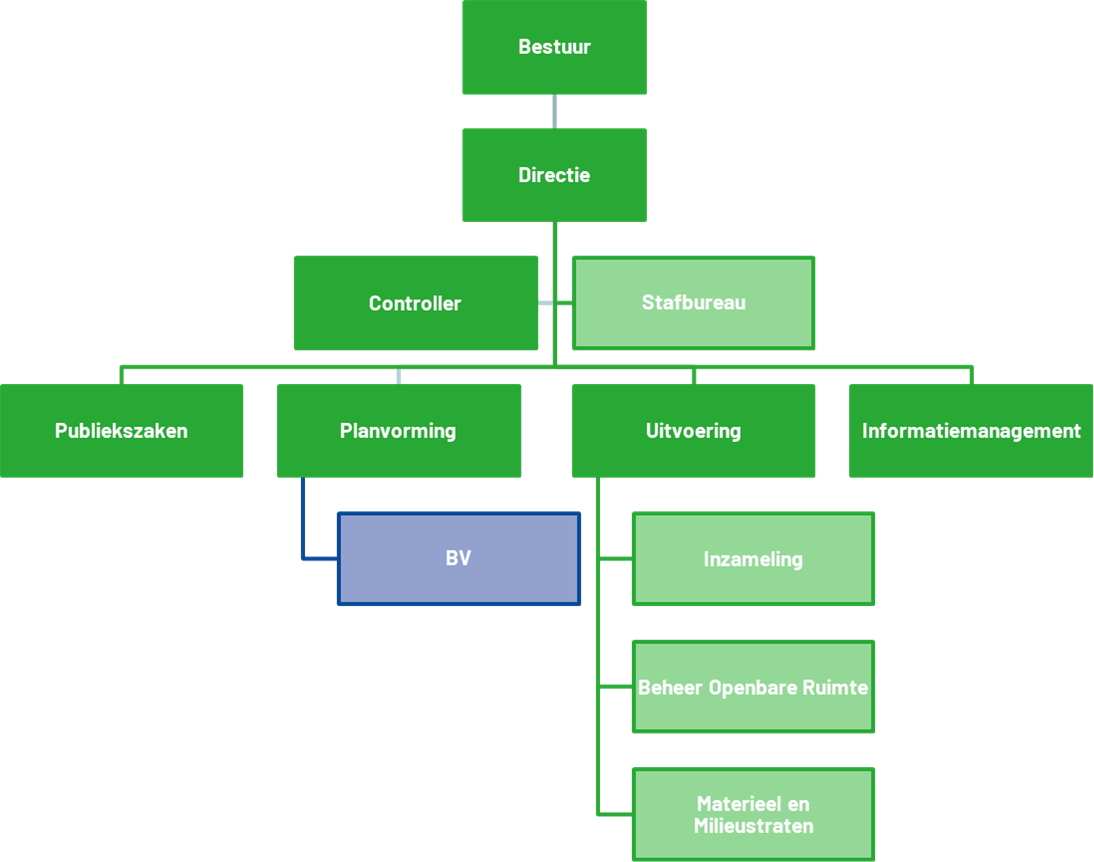This page shows at a glance how our organisation is structured and what the roles and responsibilities of the different parts are. This helps residents understand who performs what role and how everything works together within the organisation.

Board duties and powers
- The board may adopt rules on how the organisation works, how tasks are distributed and who has what powers. The board may delegate some tasks to the director.
- The board may delegate its powers to the chief executive, if it fits within the rules.
- The board appoints, suspends and dismisses the director and controller.
- The board may perform official legal acts on behalf of the organisation, such as signing contracts. These are called private law acts.
- The board may go to court on behalf of the organisation, object to decisions or take other legal action. The board may also arrange things to prepare for such steps.
- The board manages and oversees everything that happens within the organisation.
- The board may authorise one or more members to perform certain tasks or powers. This is only allowed if the rules allow it and the task is suitable to be transferred. The rules in the General Administrative Law Act apply here.
- The board adopts the (draft) budget and the (draft) financial statements.
The powers of the chairman and secretary
- The chairman leads the board meetings. If the chairman is absent, the deputy chairman takes over this task.
- The chairman and secretary sign all official documents of the board. The board may decide that the director of the organisation may sign some documents.
- The chairman represents the organisation, for example in legal matters or other official appointments. He may appoint someone else to do so on his behalf. If the chairman himself is involved in a legal case, or if he represents the municipality involved in the case, the board chooses another board member to represent the organisation.
Duties and powers of director
- The director is in day-to-day charge of the organisation
- The director is responsible for hiring, suspending, disciplining and dismissing employees with employment contracts under civil law. The director can also appoint, suspend and dismiss officials other than the controller.
- Secretary to the board.
- Director within the meaning of the Works Councils Act. Here, the director is responsible for communication with the works council and employee representation within the organisation.
- Steering organisational development
- Making the organisation visible and its role clear in the environment in which it works, such as within government and other organisations.
- Partnering with community partners and networks to achieve goals together.
Duties and powers controller
- Report to director and board
- Ensuring the organisation complies with laws and regulations.
Tasks and powers of the staff office
- Drafting HRM policy (including strategic human resources policy and regulations)
- Supporting the director as director for the works council
- Monitoring developments in the field of collective labour agreements and occupational health and safety
- Advising and supporting managers on management issues; such as recruitment & selection
- Ensure communication with employees on HRM matters, such as job information, policies and other important announcements.
- Ensure that processes around anniversaries, salary increases and appointments are properly implemented and done on time.
- Management of personnel files
Duties and powers Public Affairs
- Answering questions from residents.
- Taking complaints, notifications and reservations.
- Issue of materials to residents.
- Communication with residents through the website, app, social media and door-to-door newspapers.
- Ensure the sharing of information about the organisation's policies with the media.
- Coordinate with municipalities on how we communicate on all topics related to waste and raw materials and cicularity.
- Teaching or providing information on circular economy
- Explain to residents how to prevent waste and separate waste and raw materials properly.
- Enforce rules for disposing of waste and raw materials.
Duties and powers Planning
- Make proposals to improve waste collection, based on information from other departments on routes and collection days.
- Keeping abreast of developments in raw materials and equipment.
- Ensure good cooperation with HVC in day-to-day operations.
- Maintaining records of investments, such as buildings and vehicles, and processing claims.
- Quality, working conditions and environmental coordination (KAM)
- Leading the implementation of projects
- Draw up implementation plans for litter, ice control and weed control, among others.
- Contact with environmental services.
- Customer contact and contract management corporate waste
- Taking care of the BV's P&C cycle, a process in which plans are made, performance is measured and adjusted where necessary, to achieve the organisation's goals.
Duties and powers Information management
- Ensure financial reporting and accountability within the P&C cycle.
- Managing commodity records.
- Management of timesheets.
- Reviewing data and turning it into actionable information that helps make decisions.
- Support budget managers.
- Relationship management with the Central Bureau of Statistics (CBS)
- Ensuring the management of all insurance of the organisation.
- Debtor and creditor administration.
- Preparation of annual programmes for municipalities.
- Steering the P&C cycle
- Legal support
Duties and powers Implementation
Collection team
- Waste and resource collection.
- Issue new means of collection, such as containers.
Public Space Management Team
- Removal of side placements in Gorinchem.
- Weed removal from hard surfaces such as roads and paths in Hardinxveld-Giessendam.
- Emptying bins in Gorinchem and outlying areas.
- Sweeping hard surfaces, such as roads and paths.
Waste recycling and equipment team
- Management of environmental centres.
- Issuing rented trailers.
- Daily contact partners environmental centres.
- Maintaining vehicles and tools.
- Taking care of repairs.
- Maintenance of collection tools in the neighbourhoods, such as collection containers.
- Terrain management.
- Taking care of everything needed in the office, such as furniture, computers, cleaning and food.








